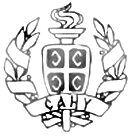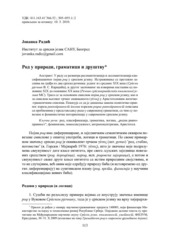Приказ основних података о документу
Род у природи, граматици и друштву
Gender in Nature, Grammar and Society
| dc.creator | Радић, Јованка | |
| dc.date.accessioned | 2020-11-27T08:05:13Z | |
| dc.date.available | 2020-11-27T08:05:13Z | |
| dc.date.issued | 2010 | |
| dc.identifier.uri | https://dais.sanu.ac.rs/123456789/9623 | |
| dc.description.abstract | This paper discusses the process of meaning deconstruction of the noun gender, a notion which has a special role in classification of natural and grammatical entities. The analysis is based on sources from the two Serbian dictionaries, one from the middle of 19th century (Српски рјечник by V. S. Karadzic), and the other based on sources from the middle of 19th and 20th century (Речник српско хрват - ског књижевног језика). The research focused on basic meanings of the notion gender in classification of physical entities and „names“ in Antique, foremost in Aristotle’s logical opus. The analysis points out to the wrong contemporary interpretation of gender in modern gramatography and subsequent baseless feministic intervention within the language. Furthermore, the analysis reveals that after initial rigid differentiation and classification of names and non-linguistic entities on genders and kinds, there followed an admixture of nature of names with nature of other non-linguistic entities, including three-particle logical structure. Moreover, this paper point out to logically unfounded division of humans into genders, as well as on to unjustified switch of political-legal expression of equality of sexes to gender equality. | en |
| dc.description.abstract | У раду се разматра ресемантизација и десемантизација класификационог појма род у српском језику. Истраживање се претежно заснива на грађи из два српска речника: једног из средине ХIХ века (Српски рјечник В. С. Караџића), и другог заснованог на изворима насталим од половине ХIХ до половине ХХ века (Речник срискохрвашскола књижевнол језика МС). Трага се за основним смислом појма род у српском језику, као и за смислом његовог грчког еквивалента (γένος) у Аристотеловим логичко-граматичким списима. Показује се да је данашња замена политичко-правног израза равноиравносш иолова изразом родна равноиравносш повезана са проблемима у представљању рода у савременој граматици, са чим су повезане и феминистичке интервенције у савременом српском језику. | sr |
| dc.language.iso | sr | sr |
| dc.publisher | Београд : Етнографски институт САНУ | sr |
| dc.relation | info:eu-repo/grantAgreement/MESTD/MPN2006-2010/148001/RS// | |
| dc.rights | openAccess | sr |
| dc.rights.uri | https://creativecommons.org/licenses/by-nc-nd/4.0/ | |
| dc.source | Гласник Етнографског института САНУ | sr |
| dc.subject | род | sr |
| dc.subject | класификација | sr |
| dc.subject | граматика | sr |
| dc.subject | логика | sr |
| dc.subject | „родна равноправност“ | sr |
| dc.subject | феминизам | sr |
| dc.subject | хомосексуалност | sr |
| dc.subject | антропоцентризам | sr |
| dc.subject | Аристотел | sr |
| dc.subject | gender | sr |
| dc.subject | classification | sr |
| dc.subject | nature | sr |
| dc.subject | grammar | sr |
| dc.subject | logic | sr |
| dc.subject | „middle element“ | sr |
| dc.subject | feminism | sr |
| dc.subject | homosexuality | sr |
| dc.subject | anthropocentrism | sr |
| dc.subject | Aristotle | sr |
| dc.title | Род у природи, граматици и друштву | sr |
| dc.title | Gender in Nature, Grammar and Society | en |
| dc.type | article | sr |
| dc.rights.license | BY-NC-ND | sr |
| dcterms.abstract | Radić, Jovanka; Rod u prirodi, gramatici i društvu; | |
| dc.citation.spage | 113 | |
| dc.citation.epage | 127 | |
| dc.citation.volume | 58 | |
| dc.citation.issue | 1 | |
| dc.type.version | publishedVersion | sr |
| dc.identifier.fulltext | https://dais.sanu.ac.rs/bitstream/id/40106/radic.rod.u.prirodi.2010.pdf | |
| dc.identifier.rcub | https://hdl.handle.net/21.15107/rcub_dais_9623 |

